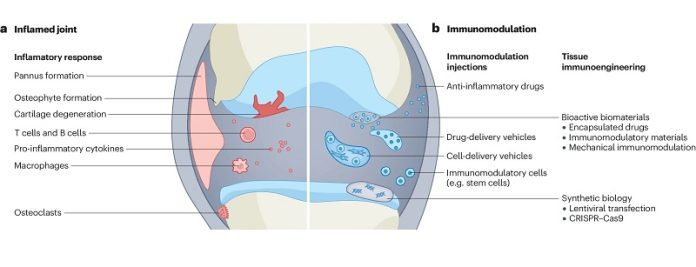
Arthritis affects nearly 600 million people worldwide and costs the U.S. healthcare system about $16.5 billion each year.
Despite this, there are very few effective treatments for arthritis, especially when it comes to using tissue-engineered therapies to repair damaged cartilage.
In a recent review published in Nature Reviews Rheumatology, biomedical engineers from the University of California, Irvine, are pushing for a new approach to help people suffering from severe osteoarthritis and rheumatoid arthritis.
The researchers, led by Kyriacos Athanasiou, a Distinguished Professor of biomedical engineering, discussed several new technologies developed to treat diseases and disorders related to cartilage in joints like the knee, hip, and jaw.
Even with years of research, no treatments have been created specifically for severe osteoarthritis or rheumatoid arthritis.
One of the key ideas explored in the review is using tissue-engineered cartilage implants that can survive in the body’s inflamed environment.
The researchers believe that new methods, such as immunomodulatory biomaterials and synthetic biology, could help these implants last longer. They also compared the benefits of using cells from donors (allogeneic) versus cells from the person receiving treatment (autologous).
Benjamin Bielajew, one of the lead co-authors and a postdoctoral scholar in biomedical engineering, explained that while researchers have been working toward tissue-engineered cartilage for decades, it has been a slow and difficult process.
“Cartilage repair products have been slow to reach the market and have significant limitations,” he said. However, Bielajew remains optimistic, stating that recent advances in the field give hope for better treatments for people suffering from joint issues.
Bringing New Treatments to Patients
Rachel Nordberg, another lead co-author and a research specialist in biomedical engineering, emphasized the importance of translating these new technologies from the lab to the marketplace.
“For academic researchers, it’s not enough to develop these technologies in the lab. We need to understand how to bring these treatments to patients,” she said. This includes navigating regulatory approvals from agencies like the FDA, securing funding for clinical trials, and eventually getting these products to the public.
Nordberg believes that by focusing on both research and commercialization, there is great potential to create a new generation of therapies for arthritis.
These advancements could provide relief for millions of people suffering from joint pain and disabilities.
Through these efforts, scientists hope to finally deliver tissue-engineered cartilage treatments that can help patients regain mobility and improve their quality of life.
If you care about pain, please read studies about vitamin K deficiency linked to hip fractures in old people, and these vitamins could help reduce bone fracture risk.
For more information about wellness, please see recent studies that Krill oil could improve muscle health in older people, and eating yogurt linked to lower frailty in older people.
Source: UC Irvine.



